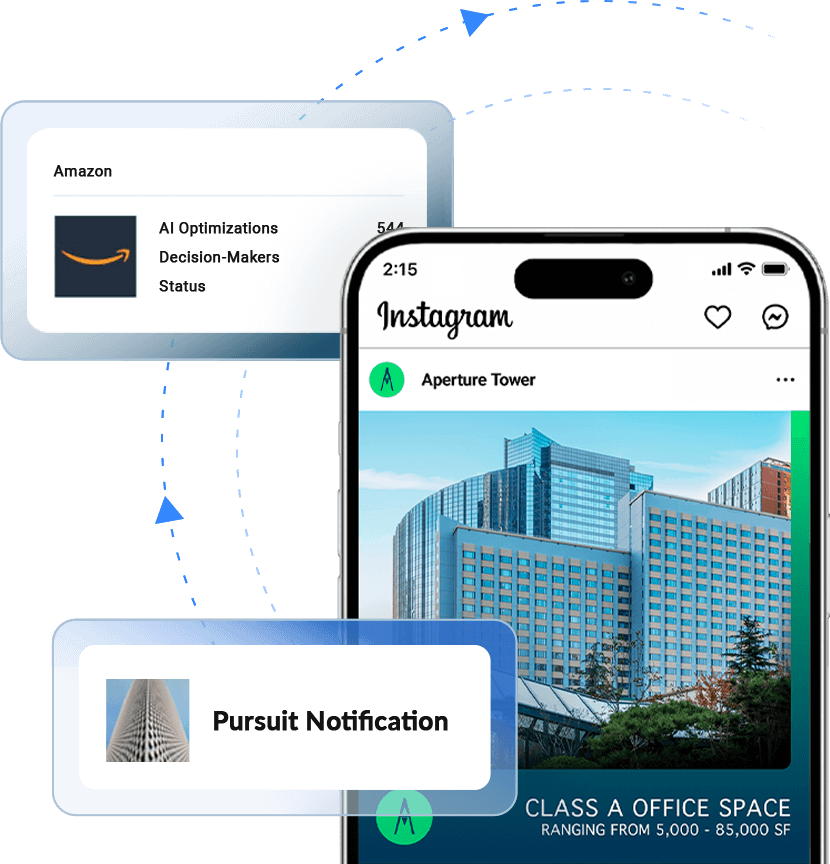The commercial real estate (CRE) market in 2025 looks very different from just a few years ago. Rising interest rates, shifting tenant expectations, and longer vacancy cycles are pressuring owners and brokers to operate faster and smarter. At the same time, technology is evolving at a pace the industry has rarely seen before. AI and automation have moved beyond buzzwords; they are becoming essential tools for reaching prospects, engaging tenants, and improving leasing outcomes.
Adoption Is Accelerating
Recent research shows how quickly the industry is adopting these tools. Deloitte’s 2025 Commercial Real Estate Outlook found that 76% of CRE firms are either testing or actively using AI in areas like financial planning, tenant engagement, and marketing. McKinsey estimates that generative AI alone could unlock $110–$180 billion in value for real estate by helping firms choose assets more effectively, cut operating costs, and improve tenant experiences.
Smarter Ads, Faster Optimization
Advertising strategies in CRE have also changed dramatically. In the past, teams have relied listings, manual ad placements, and generic messaging. That approach isn’t working anymore and prospects now expect relevant information delivered on the platforms they use most.
AI enables predictive targeting, using data to find prospects most likely to engage based on their behavior, property details, and market trends. Automation then helps, ensuring ads run across channels like Google, LinkedIn, and display networks, with real-time adjustments to creative, budget, and placement for better results.
The Role of Generative AI in Creative Production

Generative AI is transforming how content gets created. The Interactive Advertising Bureau reports that nearly 90% of advertisers already use or plan to use AI for video production, and by 2026, up to 40% of all video ads could be AI-generated.
For CRE, this means property tours, market updates, and leasing announcements can be produced quickly and at scale, freeing marketing teams from repetitive work so they can focus on strategy and storytelling.
Automation Extends Beyond Marketing
The advantages of automation go beyond lead generation. It’s also simplifying tasks like reporting, data management, and tenant communications after leases are signed. Brokers using automation for listing updates, document prep, and follow-up emails report saving hours every week—time they can spend building relationships and closing deals.
Challenges That Need Solving
Of course, adopting these tools comes with challenges. Many CRE firms still lack the data systems needed to get the most out of AI, with only 14% reporting strong data governance and privacy practices. Accuracy, transparency, and compliance also remain big concerns, especially in an industry where details like zoning or square footage directly impact deals. Quality control will always be essential as automation takes on more tasks.
What This Means for RealtyAds
For RealtyAds, this shift is both a challenge and an opportunity. The challenge is helping clients adopt AI and automation without making things more complex or risky. The opportunity is in offering solutions that not only run smarter ad strategies but also deliver real results: faster leasing, fewer vacancies, and better tenant engagement.
The Path Forward
AI and automation are no longer optional, they’re becoming the foundation for how properties are marketed, tenants are engaged, and deals are closed. Firms that embrace these tools now will move faster, operate more efficiently, and stay ahead of the competition.

